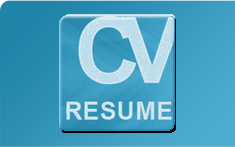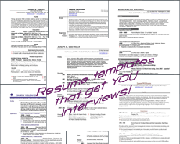
Sample resumes
How to make a CV-Resume
Resume cover letter
Personal Branding
CV-Resume: Sample resumes
When it comes to looking for a job you will often need to send your CV Resume to companies. However it can be difficult to know exactly what to include in your CV Resume so that you can improve your chances of the company considering you as a potential candidate.
Everyone has their own ideas about what a CV Resume should include and that's why it's important that when it comes to writing your CV Resume you include all the information that is most relevant to the job you are applying to. It's important that you tailor the information you include so that it is suited to the job you are applying for. Knowing exactly what to include is difficult especially when, as a general rule, your CV Resume should be no longer than two pages.
A CV Resume should have a good introduction, as this is presented as a type of summary for the employer. Take care with how you word things. As for the content of the CV Resume, this should be in an easy to read format so that the employer decides to call you for an interview.
You should always bear in mind that the CV Resume should be the perfect summary of yourself. Your CV Resume should be effective, simple and straightforward; so as to attract the attraction of the person reading it.
Here are different formats of how to structure your CV Resume, helping to make yours as appropriate and efficient as it can be. There is no right or wrong when it comes to writing a CV Resume, so how do you know which format is best?
One of the first things you should do when it comes to deciding on the format you are going to follow is to think about why you are writing the CV Resume. Think about what skills the position calls for, the aims and objectives of the business and the value that hiring you could bring to the business. You then want to choose the best format for displaying all your skills and achievements, whether they are academic or professional, to make yourself stand out among the competition. No matter which one you chose the main aim is that you sell yourself well enough to land an interview for the job you are applying to.
Remember that the position you are applying for will also make a difference to the type of CV Resume you should chose. If you are applying for a job as a store manager, for example, the information you need to highlight on your CV Resume will be different than if you were going for a position as a shop assistant. In order to help you decide what format is best for the job, here are a few examples of the different formats available.
Sample resume: Professional and functional format
Here you will find samples for a professional and functional format, which is ideal if you are applying to a prestigious company. This type of CV Resume will help you to make a good impression. With this type of CV Resume the emphasis is placed on your skills and accomplishments. It helps to showcase what you know and what you have accomplished to date, rather than where you have worked.
This type of format can be particularly useful for graduate students looking for jobs. It is also useful if, for whatever reason, you have had gaps in your employment or have changed your job frequently.
Sample resume: Experienced and combined format
This type of CV Resume tends to focus more on highlighting any previous job experience which is relevant to the post you are currently applying for. As the name suggests it is a mix between the functional and chronological format. It gives your potential employer a summary of your career, as well as a brief summary of your education and details of the skills you have acquired.
Sample resume: Executive and chronological format
This presents your CV Resume in a more executive way, putting your work experience in chronological order. You can do this by going from your oldest to most recent jobs, so your employer can see your professional development. This type of CV Resume shows a potential employer that you are experienced in the field, and is best to use if your previous jobs have had impressive titles, as this is what will stand out to the employer.
It is best to use this format if your professional experience is all in the same field and if you don’t have large gaps in your employment history.
Sample resume: What you shouldn´t do
When it comes to writing a CV Resume there are some things you simply shouldn’t do. Here you will find examples for exactly how not to write your CV Resume. Your personal information shouldn't be the focus of your CV Resume, as this is not what will land you an interview for the job. It's important that you use your CV Resume as your marketing tool so that any potential employer can see who you are and what you have achieved.
And to finish ... an example to make you laugh ...
Remember that your CV Resume will be the first impression that your potential employer has of you, so how it looks is important. Whatever format you choose to go for make sure that it creates the right first impression.
In order to do this one of the most important things is that you check the spelling and grammar for everything you have written. Once you have sent the CV Resume to your potential employer you won't be able to fix any mistakes, so be sure it is being sent off as best as it can be.
